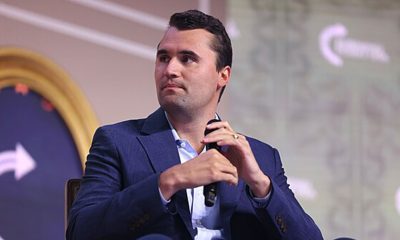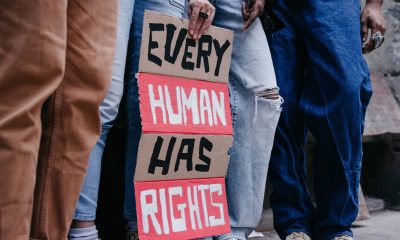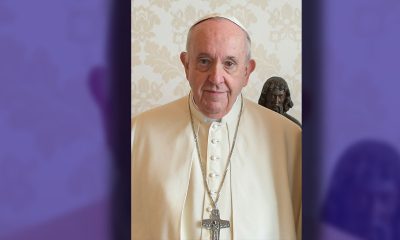Community
Christian and Muslim Prisoners Forgive Each Other
“The longer I held it to myself, the angrier I got. But, God had another plan. I understood that the killing of my brothers stops with me.”
By Juan Haines, San Quentin News Managing Editor
For years, a Christian and a Muslim prisoner lived in the same housing unit, mentoring their fellow convicts.
One was a church elder, the other a military veteran and self-help facilitator. Each knew little of the other’s past — one had murdered the other’s uncle, while the nephew vowed one day to avenge his uncle’s death.
When the two eventually met to reconcile the past, more than 100 inmates stood in a prison chapel, clapping their hands to the rhythm of a tambourine and singing, “I got a feeling that everything is going to be all right.”
“Twenty years ago, I committed a crime. I murdered Mr. Brian Thompson,” Derrick Holloway told the audience. His sermon centered on the importance of forgiveness.
Holloway compared un-forgiveness to dropping an anchor and saying, “This is where I’m going to be. Like with brothers and sisters, the justice system, cellies, friends, different faiths. The Lord is challenging us to pick up that anchor, because a storm is coming.”
Holloway invited the nephew of the person he murdered to the stage.
Abdul Raheem Thompson-Bonilla walked up to Holloway, embraced him and with tears in his eyes said, “I want him to share some words; it’s a funny thing, how men have thoughts, and God steps in. God has showed favor on me and opened my heart.”
The audience stood up and gave applause.
Thompson-Bonilla told the audience what 18 years of unforgiving and vengeance could do to a person.
“The longer I held it to myself, the angrier I got. But, God had another plan. I understood that the killing of my brothers stops with me,” he said.
“I could not deny the favor of forgiveness that God has given me. So, when it came to my brother, Holloway, I looked him in the eye, and told him that I forgive him.”
Holloway went on to talk about the meaning of true forgiveness.
“We need to forgive each other without condition,” he said.
“To be long-suffering with your brother,” he continued. “If you want forgiveness, you’ve got to give it. When you sit in that boardroom, you want forgiveness. We in prison have a way of pushing away some inmates who committed a certain kind of crime, but we have to forgive everyone. In order to have forgiveness, there must be dialogue. If there’s going to be real forgiveness, there must be some type of dialogue. I think that Victims Offender Education Group has it right when they make people write a forgiveness letter. You have to have a conversation.”
Holloway warned of the dangers of not forgiving, or saying, “I’m not going to forgive.”
“I believe that many of us, right now, are seeing the faces of those to who we are saying, ‘I will not forgive.’ Like the one who told on me, I would not forgive. My brother, I would not forgive. My pastor, I would not forgive. My enemy, I would not forgive. My wife, I would not forgive. This is not a Christian thing, this is not a religious thing,” Holloway said. “It’s a human thing. We all need to forgive in order to defeat our enemy.”
He said that the enemy keeps the door of un-forgiveness open. “There are a lot of us who have these places of un-forgiveness.”
“The foundation of what Christ did was forgiveness. So, if the enemy knows he can shake your foundation of forgiveness, then he has you,” Holloway warned. “Father forgive them, because they know not what they do,” Holloway read from the Bible.
Holloway invited everyone in the church to come forward if they had issues of un-forgiveness that they’d like to address.
More than half the church went forward as a pastor prayed that they’d find forgiveness in their lives.
“Dear Lord, I give you all the hurt that I’ve done to others. Today I give it all to you,” the pastor said. “Every bit of it. Today, you break the pain and anguish. So that the men here can walk out of here free. No one will leave this place the same.”
Thompson-Bonilla thanked everyone who facilitated the meeting, including other veterans and all his Muslim brothers, who he said didn’t know the particulars of why they were in church that day.
Activism
Oakland Post: Week of December 31, 2025 – January 6, 2026
The printed Weekly Edition of the Oakland Post: Week of – December 31, 2025 – January 6, 2026

To enlarge your view of this issue, use the slider, magnifying glass icon or full page icon in the lower right corner of the browser window.
Activism
Big God Ministry Gives Away Toys in Marin City
Pastor Hall also gave a message of encouragement to the crowd, thanking Jesus for the “best year of their lives.” He asked each of the children what they wanted to be when they grow up.

By Godfrey Lee
Big God Ministries, pastored by David Hall, gave toys to the children in Marin City on Monday, Dec. 15, on the lawn near the corner of Drake Avenue and Donahue Street.
Pastor Hall also gave a message of encouragement to the crowd, thanking Jesus for the “best year of their lives.” He asked each of the children what they wanted to be when they grew up.
Around 75 parents and children were there to receive the presents, which consisted mainly of Gideon Bibles, Cat in the Hat pillows, Barbie dolls, Tonka trucks, and Lego building sets.
A half dozen volunteers from the Big God Ministry, including Donnie Roary, helped to set up the tables for the toy giveaway. The worship music was sung by Ruby Friedman, Keri Carpenter, and Jake Monaghan, who also played the accordion.
Big God Ministries meets on Sundays at 10 a.m. at the Mill Valley Community Center, 180 Camino Alto, Mill Valley, CA Their phone number is (415) 797-2567.
Activism
First 5 Alameda County Distributes Over $8 Million in First Wave of Critical Relief Funds for Historically Underpaid Caregivers
“Family, Friend, and Neighbor caregivers are lifelines for so many children and families in Alameda County,” said Kristin Spanos, CEO, First 5 Alameda County. “Yet, they often go unrecognized and undercompensated for their labor and ability to give individualized, culturally connected care. At First 5, we support the conditions that allow families to thrive, and getting this money into the hands of these caregivers and families at a time of heightened financial stress for parents is part of that commitment.”

Family, Friend, and Neighbor Caregivers Can Now Opt Into $4,000 Grants to Help Bolster Economic Stability and Strengthen Early Learning Experiences
By Post Staff
Today, First 5 Alameda County announced the distribution of $4,000 relief grants to more than 2,000 Family, Friend, and Neighbor (FFN) caregivers, totaling over $8 million in the first round of funding. Over the full course of the funding initiative, First 5 Alameda County anticipates supporting over 3,000 FFN caregivers, who collectively care for an estimated 5,200 children across Alameda County. These grants are only a portion of the estimated $190 million being invested into expanding our early childcare system through direct caregiver relief to upcoming facilities, shelter, and long-term sustainability investments for providers fromMeasure C in its first year. This investment builds on the early rollout of Measure C and reflects a comprehensive, system-wide strategy to strengthen Alameda County’s early childhood ecosystem so families can rely on sustainable, accessible care,
These important caregivers provide child care in Alameda County to their relatives, friends, and neighbors. While public benefits continue to decrease for families, and inflation and the cost of living continue to rise, these grants provide direct economic support for FFN caregivers, whose wages have historically been very low or nonexistent, and very few of whom receive benefits. As families continue to face growing financial pressures, especially during the winter and holiday season, these grants will help these caregivers with living expenses such as rent, utilities, supplies, and food.
“Family, Friend, and Neighbor caregivers are lifelines for so many children and families in Alameda County,” said Kristin Spanos, CEO, First 5 Alameda County. “Yet, they often go unrecognized and undercompensated for their labor and ability to give individualized, culturally connected care. At First 5, we support the conditions that allow families to thrive, and getting this money into the hands of these caregivers and families at a time of heightened financial stress for parents is part of that commitment.”
The funding for these relief grants comes from Measure C, a local voter-approved sales tax in Alameda County that invests in young children, their families, communities, providers, and caregivers. Within the first year of First 5’s 5-Year Plan for Measure C, in addition to the relief grants to informal FFN caregivers, other significant investments will benefit licensed child care providers. These investments include over $40 million in Early Care and Education (ECE) Emergency Grants, which have already flowed to nearly 800 center-based and family child care providers. As part of First 5’s 5-Year Plan, preparations are also underway to distribute facilities grants early next year for child care providers who need to make urgent repairs or improvements, and to launch the Emergency Revolving Fund in Spring 2026 to support licensed child care providers in Alameda County who are at risk of closure.
The FFN Relief Grants recognize and support the essential work that an estimated 3,000 FFN caregivers provide to 5,200 children in Alameda County. There is still an opportunity to receive funds for FFN caregivers who have not yet received them.
In partnership with First 5 Alameda County, Child Care Payment Agencies play a critical role in identifying eligible caregivers and leading coordinated outreach efforts to ensure FFN caregivers are informed of and able to access these relief funds.FFN caregivers are eligible for the grant if they receive a child care payment from an Alameda County Child Care Payment Agency, 4Cs of Alameda County, BANANAS, Hively, and Davis Street, and are currently caring for a child 12 years old or younger in Alameda County. Additionally, FFN caregivers who provided care for a child 12 years or younger at any time since April 1, 2025, but are no longer doing so, are also eligible for the funds. Eligible caregivers are being contacted by their Child Care Payment Agency on a rolling basis, beginning with those who provided care between April and July 2025.
“This money is coming to me at a critical time of heightened economic strain,” said Jill Morton, a caregiver in Oakland, California. “Since I am a non-licensed childcare provider, I didn’t think I was eligible for this financial support. I was relieved that this money can help pay my rent, purchase learning materials for the children as well as enhance childcare, buy groceries and take care of grandchildren.”
Eligible FFN caregivers who provided care at any time between April 1, 2025 and July 31, 2025, who haven’t yet opted into the process, are encouraged to check their mail and email for an eligibility letter. Those who have cared for a child after this period should expect to receive communications from their child care payment agency in the coming months. FFN caregivers with questions may also contact the agency they work with to receive child care payments, or the First 5 Alameda help desk, Monday through Friday, from 9 a.m. to 5:00 p.m. PST, at 510-227-6964. The help desk will be closed 12/25/25 – 1/1/26. Additional grant payments will be made on a rolling basis as opt-ins are received by the four child care payment agencies in Alameda County.
Beginning in the second year of Measure C implementation, FFN caregivers who care for a child from birth to age five and receive an Alameda County subsidized voucher will get an additional $500 per month. This amounts to an annual increase of about $6,000 per child receiving a subsidy. Together with more Measure C funding expected to flow back into the community as part of First 5’s 5-Year Plan, investments will continue to become available in the coming year for addressing the needs of childcare providers in Alameda County.
About First 5 Alameda County
First 5 Alameda County builds the local childhood systems and supports needed to ensure our county’s youngest children are safe, healthy, and ready to succeed in school and life.
Our Mission
In partnership with the community, we support a county-wide continuous prevention and early intervention system that promotes optimal health and development, narrows disparities, and improves the lives of children from birth to age five and their families.
Our Vision
Every child in Alameda County will have optimal health, development, and well-being to reach their greatest potential.
Learn more at www.first5alameda.org.
-

 Bay Area3 weeks ago
Bay Area3 weeks agoPost Salon to Discuss Proposal to Bring Costco to Oakland Community meeting to be held at City Hall, Thursday, Dec. 18
-

 Activism3 weeks ago
Activism3 weeks agoMayor Lee, City Leaders Announce $334 Million Bond Sale for Affordable Housing, Roads, Park Renovations, Libraries and Senior Centers
-

 Activism3 weeks ago
Activism3 weeks agoOakland Post: Week of December 10 – 16, 2025
-

 Activism3 weeks ago
Activism3 weeks agoOakland School Board Grapples with Potential $100 Million Shortfall Next Year
-

 Arts and Culture3 weeks ago
Arts and Culture3 weeks agoFayeth Gardens Holds 3rd Annual Kwanzaa Celebration at Hayward City Hall on Dec. 28
-

 Activism3 weeks ago
Activism3 weeks ago2025 in Review: Seven Questions for Black Women’s Think Tank Founder Kellie Todd Griffin
-

 Advice3 weeks ago
Advice3 weeks agoCOMMENTARY: If You Don’t Want Your ‘Black Card’ Revoked, Watch What You Bring to Holiday Dinners
-

 Activism3 weeks ago
Activism3 weeks agoAnn Lowe: The Quiet Genius of American Couture























































